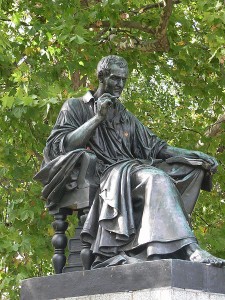Influence

Picture of statue
by DesertEagle, used under 
Rousseau’s ideas surfaced around the Age of Reason, when many philosophers were making public their criticisms of society and government. They wanted to rationalize their critiques by appealing to the nature of man, and “the point was to justify a particular type of government by relating it to human nature, that is, to the defining characteristics of human beings” (Creed, 1999). Most thinkers of this period agreed that to have a legitimate government, the governed people must agree on it. However, most philosophers disagreed on their understanding of the natural state of a human being.
Rousseau also believed in the power of education, and he came up with his own plan for how a child should learn. He states that education should be a “prolonged experience of things rather than an introduction to ideas” (Creed, 1999). Children should develop their own will and reasoning, then religion and other “abstractions” can be introduced into their education. That way, they can form their own opinions before being influenced by others.
Rousseau was part of the spreading Enlightenment ideas when people began questioning and thinking for themselves. They began discussing the government and a separation of powers, as well as freedom, tolerance, and birth rights. His ideas were a part of changing people’s minds about their government and how their society was run, and he helped the French people realize that a monarchy was not fair.
This accompanied rising democratic sentiment in the United States, which focused discussion on the slave trade. Most of his work provided the basis for antislavery arguments. His “contradiction between principles of natural equality and the realities of convention undermined proslavery arguments grounded in notions of the “naturalness” of slavery and in scripture” (Berleant, 2007).
References:
Berleant, R.(2007). Rousseau, Jean Jacques. In Encyclopedia of emancipation and abolition in the transatlantic world. Retrieved from https://ezproxy.butler.edu/login?qurl=http%3A%2F%2Fsearch.credoreference.com%2Fcontent%2Fentry%2Fsharpeeman%2Frousseau_jean_jacques%2F0
Creed, Constance. (1999). “Jean-Jacques Rousseau.” Great thinkers of the western world.” 271. Retrieved from http://ic.galegroup.com/ic/whic/ReferenceDetailsPage/ReferenceDetailsWindow?failOverType=&query=&prodId=WHIC&windowstate=normal&contentModules=&mode=view&displayGroupName=Reference&limiter=&u=butleru&currPage=&disableHighlighting=false&displayGroups=&sortBy=&source=&search_within_results=&p=WHIC%3AUHIC&action=e&catId=&activityType=&scanId=&documentId=GALE%7CA55035824
